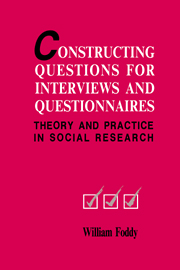Book contents
- Frontmatter
- Contents
- Tables
- Figures
- Preface
- Chapter 1 An initial statement of the problem
- Chapter 2 A theoretical framework
- Chapter 3 Defining topics properly
- Chapter 4 Formulating intelligible requests for information
- Chapter 5 Contextual influences on respondents' interpretations of questions
- Chapter 6 The need to provide response frameworks
- Chapter 7 The limitations of human memory
- Chapter 8 Filters: establishing the relevance of questions to respondents
- Chapter 9 Reducing question threat
- Chapter 10 The open vs. closed questions debate
- Chapter 11 Measuring attitudes
- Chapter 12 Checks to ensure that questions work as intended
- Chapter 13 Concluding comments
- The tap paradigm
- References
- Index
- Acknowledgements
Chapter 7 - The limitations of human memory
Published online by Cambridge University Press: 04 September 2009
- Frontmatter
- Contents
- Tables
- Figures
- Preface
- Chapter 1 An initial statement of the problem
- Chapter 2 A theoretical framework
- Chapter 3 Defining topics properly
- Chapter 4 Formulating intelligible requests for information
- Chapter 5 Contextual influences on respondents' interpretations of questions
- Chapter 6 The need to provide response frameworks
- Chapter 7 The limitations of human memory
- Chapter 8 Filters: establishing the relevance of questions to respondents
- Chapter 9 Reducing question threat
- Chapter 10 The open vs. closed questions debate
- Chapter 11 Measuring attitudes
- Chapter 12 Checks to ensure that questions work as intended
- Chapter 13 Concluding comments
- The tap paradigm
- References
- Index
- Acknowledgements
Summary
In the past, many survey researchers have exhibited a tendency to assume that respondents have the information they want. Yet, even when respondents have been exposed to a particular event, there is no guarantee that they will have taken in much information about it or, if they have, that they will have remembered it. It is, therefore, important that researchers understand what can reasonably be expected of respondents' memories so that this understanding can be incorporated into the design of questions requiring respondents to report information about past events in their lives.
Relevant research suggests that respondents are often not aware of many of the immediate influences on their behaviour. Laird (1932) was one of the earliest researchers to reach this conclusion. He found that respondents would choose the ‘best’ stockings from an array of identical pairs of stockings on the basis of scent, without being aware that this was what they were doing. Henry (1971) presents the results of a number of similar experiments that have produced comparable results. In one experiment, knowledge of price advantage appears to have been the main factor underlying respondents' preference although few respondents mentioned this factor. In another experiment, respondents' taste preferences were influenced by the colour of the wrapping used and again they indicated little awareness of this fact.
- Type
- Chapter
- Information
- Constructing Questions for Interviews and QuestionnairesTheory and Practice in Social Research, pp. 90 - 100Publisher: Cambridge University PressPrint publication year: 1993



